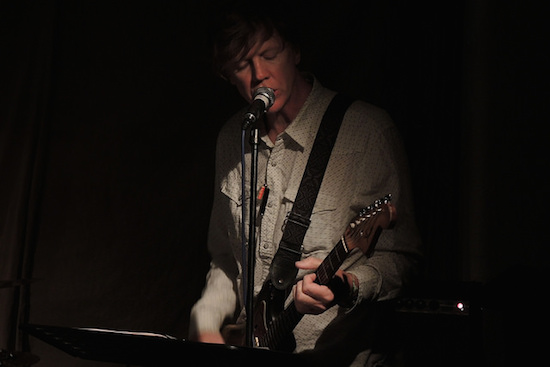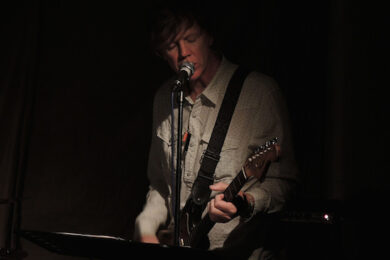Though definitely a surprise secret gig, it should come as no surprise that Thurston Moore kicked off his world tour with an evening warming up his band’s refreshed line up at Café Oto. Since moving to Stoke Newington he seems to play at Oto every other night, and several of this evening’s avid Thurstonites were still reeling from the man’s noise guitar duel with Caspar “son of Peter” Brötzmann seven days earlier. “They didn’t play a single note!” one enthused. “It was just non-stop noise! It was amazing!” Outside, there’s a poster stuck to the window advertising Lee Ranaldo’s upcoming acoustic set. The memories of Kim Gordon & Bill Nace’s terrifying/beautiful set under the Body/Head name from last year remain etched in the brains of a dedicated few. To top it off, the man-machine at the beating heart of a hundred flawless Sonic Youth jams – Steve Shelley himself -is in attendance as the drummer for the freshly-announced Thurston Moore Band. The spirit of Sonic Youth hangs almost visibly suspended in the damp English summer air.
As indebted as the world of experimental music is to the surprisingly popular experimental legacy of Thurston Moore and Sonic Youth, they were always first and foremost a punk band. Thurston Moore’s last album of songs, the Beck-produced Demolished Thoughts, was an uncharacteristic, mostly acoustic set of introspective chamber folk musings. Moore’s plugged the Jazzmaster back in again though, and his next solo record – The Best Day due out in October – taps back into rock & roll, delivering intricate, sprawling rock music with a killer backup band of Steve Shelley, Debbie Googe (My Bloody Valentine) and phenomenal English guitarist, James Sedwards (Nøught, Guapo, Chrome Hoof). Moore remains the last of the original American punks; the last one out the gate before the year punk finally broke.
The sight of Moore arriving outside is (he towers about two feet above every other head), and the atmosphere in Oto goes from coolly taciturn to ecstatic with excitement almost instantly. It’s full to bursting, with several hopeful punters getting turned away at the door only to press their noses against the glass outside as the band tune up (or perhaps down…it varies a lot with Thurton Moore compositions). Things kick off with sparse ambient randomness, as both Moore and Sedwards pluck way up at the bridge, showering bell-like tones from both sides until Thurston Moore kicks in with a militaristic power chord riff very a la Rhys Chatham’s eternal ‘Guitar Trio ‘. Shelley and Googe start up a driving urgent, classically tom-heavy beat, and the dual attack of Moore and Sedwards unleash an unfairly loud wall of strummed clatter. Reading from lyric sheets on a music stand, Thurston Moore sings in that familiar and beloved high-functioning slacker drawl, and by the song’s climactic chorus he’s visibly yearning – "that’s why I want you forever more".
Structurally, the tunes often resemble the colourful tail-head-tail jams of the Murray Street era, careening from whimsical rock through dissonant instrumental breaks before coming full circle once again. The instrumental second song begins in pin-drop silence, with the two guitarists trading gently plucked harmonics before some very Trees Outside The Academy picked guitar melodies. Thurston Moore introduces the band – “my name’s Thurston, and this is Steve, and Debbie, and James” – before launching into the heavy riffage of ‘Germs Burn’ (the B-side from the ‘Detonation’ 7-inch on Blank Editions). Sedwards unleashes a smooth, virtuosic shredding solo before trading off with Moore who replies with grating hard-as-nails free noise. The pink dissonance of ‘Detonation’ follows, which is dedicated “the Stoke Newington angry brigade”, racing through an elevating chord movement to Moore’s final screamed line: “find the truth/just you wait/we maybe have to use a toy grenade!” It’s a truly killer tribute to all of those in discontent; both cool and angry like no other can quite pull off; actually…exciting! Yet Moore remains aloof, kidding that “in a sense that is the sound of Stoke Newington, but through a Yankee lens”.
The final track is dedicated again to the memory of the Angry Brigade – the East London-based anarchist group from the 1970s responsible for several bombings (no injuries) – more specifically, to Anna Mendelssohn, the Angry Brigadier and poet who also wrote under the name Grace Lake, and was eventually sentenced to ten years in prison for the aforementioned bombings. The fiddly instrumental melodic head of the tune begets a mid-section of outright aggressive feedback that sees Googe and Shelley drop out the bottom leaving the two guitarists to seemingly enter slow-mo, squeezing and pulling and yanking at their instruments, twisting the feedback into apt sonic anarchy. Sedwards breaks a string after over abusing his whammy bar, masterfully retuning in time to swing right back into the opening theme again. The applause eventually dies down, and we head outside for a brief cessation before the band repeats the same set with even more vigour (it is essentially in informal warm-up gig after all).
The mechanic throb of the still-boisterous Debbie Googe and Steve Shelley hurtle this latest set of tunes forward with unabashedly Goo levels of furious metronomic energy, while the Moore-Sewards pairing is in fact decidedly different from the razor-sharp twin offensive with Ranaldo – a more pensive aggression, and a rounder-edged sonic stab. With Chelsea Light Moving, Moore proved his absolute mastery of the rock band format, putting together an album’s worth of material with a completely new quartet in next to no time at all. From the looks of things, The Best Day is in part reaching back to punk’s epochal founding subversion – as loud, fast and angry as Rather Ripped, or even Fun House for that matter. But it sounds like something new, and that constant originality is something Thurston Moore’s always been able to pull off. The transcendent power of good ol’ rock music feels in constant question today, with fringe music increasingly influential and populist guitar rock increasingly innocuous, but in the hands of this expert in both, there’s no shadow of a doubt in either’s resilient power. No one has ever sounded quite like Sonic Youth – but even Sonic Youth didn’t sound exactly like Thurston Moore.



